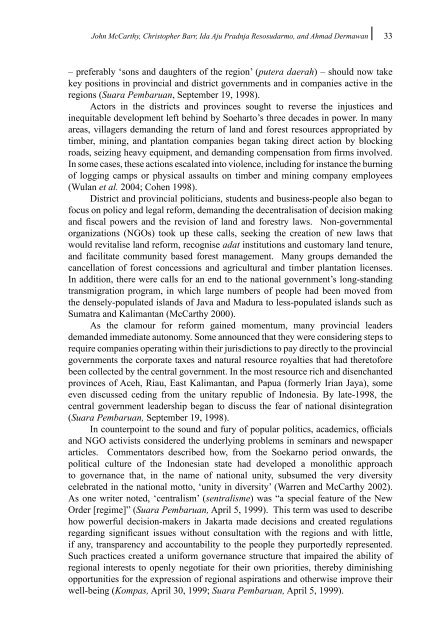Decentralization of Forest Administration in Indonesia, Implications ...
Decentralization of Forest Administration in Indonesia, Implications ...
Decentralization of Forest Administration in Indonesia, Implications ...
You also want an ePaper? Increase the reach of your titles
YUMPU automatically turns print PDFs into web optimized ePapers that Google loves.
John McCarthy, Christopher Barr, Ida Aju Pradnja Resosudarmo, and Ahmad Dermawan 33<br />
– preferably ‘sons and daughters <strong>of</strong> the region’ (putera daerah) – should now take<br />
key positions <strong>in</strong> prov<strong>in</strong>cial and district governments and <strong>in</strong> companies active <strong>in</strong> the<br />
regions (Suara Pembaruan, September 19, 1998).<br />
Actors <strong>in</strong> the districts and prov<strong>in</strong>ces sought to reverse the <strong>in</strong>justices and<br />
<strong>in</strong>equitable development left beh<strong>in</strong>d by Soeharto’s three decades <strong>in</strong> power. In many<br />
areas, villagers demand<strong>in</strong>g the return <strong>of</strong> land and forest resources appropriated by<br />
timber, m<strong>in</strong><strong>in</strong>g, and plantation companies began tak<strong>in</strong>g direct action by block<strong>in</strong>g<br />
roads, seiz<strong>in</strong>g heavy equipment, and demand<strong>in</strong>g compensation from firms <strong>in</strong>volved.<br />
In some cases, these actions escalated <strong>in</strong>to violence, <strong>in</strong>clud<strong>in</strong>g for <strong>in</strong>stance the burn<strong>in</strong>g<br />
<strong>of</strong> logg<strong>in</strong>g camps or physical assaults on timber and m<strong>in</strong><strong>in</strong>g company employees<br />
(Wulan et al. 2004; Cohen 1998).<br />
District and prov<strong>in</strong>cial politicians, students and bus<strong>in</strong>ess-people also began to<br />
focus on policy and legal reform, demand<strong>in</strong>g the decentralisation <strong>of</strong> decision mak<strong>in</strong>g<br />
and fiscal powers and the revision <strong>of</strong> land and forestry laws. Non-governmental<br />
organizations (NGOs) took up these calls, seek<strong>in</strong>g the creation <strong>of</strong> new laws that<br />
would revitalise land reform, recognise adat <strong>in</strong>stitutions and customary land tenure,<br />
and facilitate community based forest management. Many groups demanded the<br />
cancellation <strong>of</strong> forest concessions and agricultural and timber plantation licenses.<br />
In addition, there were calls for an end to the national government’s long-stand<strong>in</strong>g<br />
transmigration program, <strong>in</strong> which large numbers <strong>of</strong> people had been moved from<br />
the densely-populated islands <strong>of</strong> Java and Madura to less-populated islands such as<br />
Sumatra and Kalimantan (McCarthy 2000).<br />
As the clamour for reform ga<strong>in</strong>ed momentum, many prov<strong>in</strong>cial leaders<br />
demanded immediate autonomy. Some announced that they were consider<strong>in</strong>g steps to<br />
require companies operat<strong>in</strong>g with<strong>in</strong> their jurisdictions to pay directly to the prov<strong>in</strong>cial<br />
governments the corporate taxes and natural resource royalties that had theret<strong>of</strong>ore<br />
been collected by the central government. In the most resource rich and disenchanted<br />
prov<strong>in</strong>ces <strong>of</strong> Aceh, Riau, East Kalimantan, and Papua (formerly Irian Jaya), some<br />
even discussed ced<strong>in</strong>g from the unitary republic <strong>of</strong> <strong>Indonesia</strong>. By late-1998, the<br />
central government leadership began to discuss the fear <strong>of</strong> national dis<strong>in</strong>tegration<br />
(Suara Pembaruan, September 19, 1998).<br />
In counterpo<strong>in</strong>t to the sound and fury <strong>of</strong> popular politics, academics, <strong>of</strong>ficials<br />
and NGO activists considered the underly<strong>in</strong>g problems <strong>in</strong> sem<strong>in</strong>ars and newspaper<br />
articles. Commentators described how, from the Soekarno period onwards, the<br />
political culture <strong>of</strong> the <strong>Indonesia</strong>n state had developed a monolithic approach<br />
to governance that, <strong>in</strong> the name <strong>of</strong> national unity, subsumed the very diversity<br />
celebrated <strong>in</strong> the national motto, ‘unity <strong>in</strong> diversity’ (Warren and McCarthy 2002).<br />
As one writer noted, ‘centralism’ (sentralisme) was “a special feature <strong>of</strong> the New<br />
Order [regime]” (Suara Pembaruan, April 5, 1999). This term was used to describe<br />
how powerful decision-makers <strong>in</strong> Jakarta made decisions and created regulations<br />
regard<strong>in</strong>g significant issues without consultation with the regions and with little,<br />
if any, transparency and accountability to the people they purportedly represented.<br />
Such practices created a uniform governance structure that impaired the ability <strong>of</strong><br />
regional <strong>in</strong>terests to openly negotiate for their own priorities, thereby dim<strong>in</strong>ish<strong>in</strong>g<br />
opportunities for the expression <strong>of</strong> regional aspirations and otherwise improve their<br />
well-be<strong>in</strong>g (Kompas, April 30, 1999; Suara Pembaruan, April 5, 1999).

















